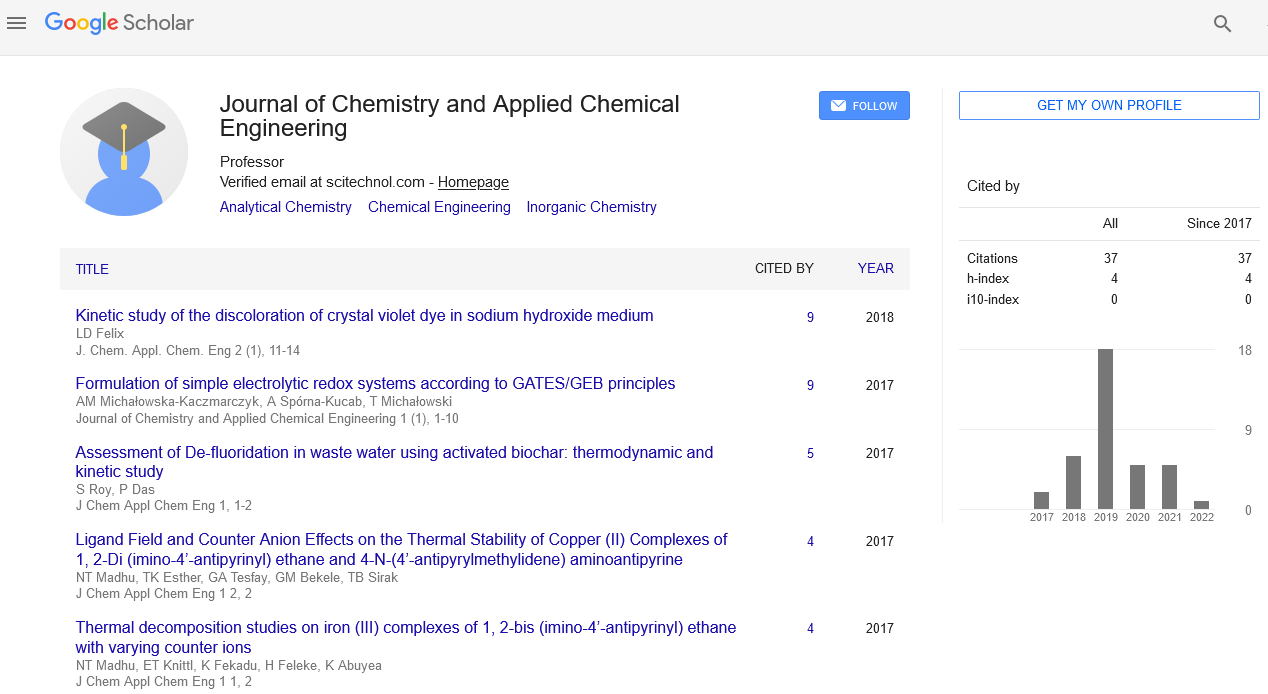Opinion Article, J Chem Appl Chem Eng Vol: 7 Issue: 1
Sustainable Approaches to the Production of Biofuels from Renewable Resources
Shashi Shree*
1Department of Biosystems Engineering, North Dakota State University, North Dakota, USA
*Corresponding Author: Shashi Shree
Department of Biosystems Engineering,
North Dakota State University, North Dakota, USA
E-mail: shashree@dbe.edu
Received date: 28 February, 2023, Manuscript No. JCACE-23-95545;
Editor assigned date: 03 March, 2023, Pre QC No. JCACE23-95545(PQ);
Reviewed date: 17 March, 2023, QC No. JCACE-23-95545;
Revised date: 24 March, 2023, Manuscript No. JCACE-23-95545 (R);
Published date: 31 March, 2023, DOI: 10.4172/Jcace.1000e018
Citation: Shree S (2023) Sustainable Approaches to the Production of Biofuels from Renewable Resources. J Chem Appl Chem Eng 7:1.
Description
Biofuels are fuels made from renewable resources such as crops, agricultural waste, and forestry residues. Biofuels have been identified as a potential alternative to fossil fuels, which are a significant contributor to global warming and environmental degradation. However, the production of biofuels can also be environmentally damaging, particularly if the production process involves land-use changes, deforestation, and the use of large amounts of water and energy. Sustainable approaches to the production of biofuels from renewable resources are necessary to ensure that the benefits of biofuels are realized without causing further environmental harm.
The choice of feedstock for biofuel production is important in determining the environmental impact of biofuels. The most commonly used feedstocks for biofuels are crops such as corn, soybeans, sugarcane, and palm oil. However, the cultivation of these crops can lead to deforestation, soil erosion, and the use of large amounts of water and agrochemicals. Sustainable approaches to biofuel production require the use of feedstocks that do not compete with food production and do not cause environmental harm. Feedstocks such as switchgrass, miscanthus, and algae are examples of sustainable feedstocks for biofuel production. These feedstocks do not require large amounts of water and agrochemicals, and they can be grown on marginal lands that are unsuitable for food production.
The production technologies used for biofuel production also play a important role in determining the environmental impact of biofuels. The most commonly used production technologies for biofuels are fermentation and transesterification. These technologies require large amounts of energy and water and can lead to the release of greenhouse gases and other pollutants. Sustainable approaches to biofuel production require the use of production technologies that are energyefficient, water-efficient, and do not produce greenhouse gases and other pollutants. Technologies such as gasification and pyrolysis are examples of sustainable production technologies for biofuels. These technologies convert biomass into a gas or liquid fuel using heat and pressure, and they do not produce greenhouse gases or other pollutants.
The environmental impact of biofuels can be assessed using Life Cycle Assessment (LCA). LCA is a method that evaluates the environmental impact of a product or process throughout its entire life cycle, from the extraction of raw materials to the disposal of waste. LCA can be used to identify the environmental impacts of different feedstocks and production technologies for biofuels and to identify opportunities to reduce environmental impact. Sustainable approaches to biofuel production require the use of feedstocks and production technologies that have low environmental impact throughout their entire life cycle.
Policy and regulations play an important role in promoting sustainable approaches to biofuel production. Governments can promote the use of sustainable feedstocks and production technologies for biofuels by providing incentives and subsidies to producers who use these approaches. Governments can also regulate the use of unsustainable feedstocks and production technologies for biofuels by imposing taxes and penalties on producers who use these approaches. The sustainability of biofuels can be certified through voluntary certification schemes such as the Roundtable on Sustainable Biofuels (RSB) and the International Sustainability and Carbon Certification (ISCC). These certification schemes provide a framework for assessing the sustainability of biofuels and can help consumers and producers make informed decisions about the sustainability of biofuels.
Sustainable approaches to the production of biofuels from renewable resources are necessary to ensure that the benefits of biofuels are realized without causing further environmental harm. Sustainable approaches require the use of feedstocks and production technologies that are energy-efficient, water-efficient, and do not produce greenhouse gases and other pollutants.
 Spanish
Spanish  Chinese
Chinese  Russian
Russian  German
German  French
French  Japanese
Japanese  Portuguese
Portuguese  Hindi
Hindi 